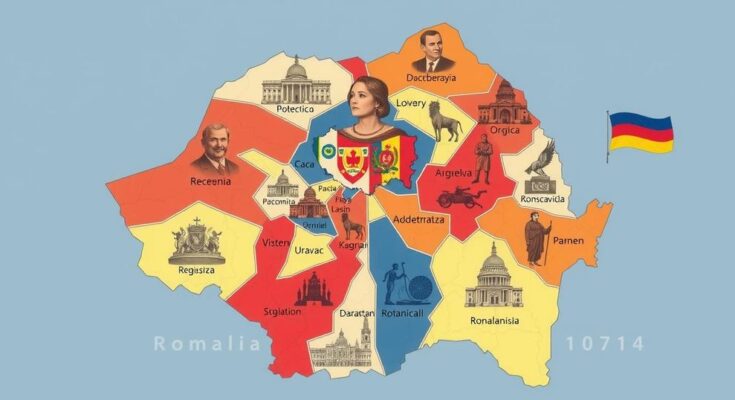Romania is currently experiencing a political crisis characterized by the rise of extreme right-wing candidates and the annulment of election results, raising concerns about democracy and governance. Internal party divisions hinder necessary reforms, and the silence from President Klaus Iohannis adds to the uncertainty of the political future following recent electoral chaos.
Romania currently finds itself navigating a politically tumultuous landscape, following its recent parliamentary and presidential election events marked by controversy and upheaval. The country’s political scene is marred by a substantial reform backlog and a growing distrust towards traditional political figures, leading to an unexpected rise of far-right, pro-Russian candidates. Notably, Calin Georgescu, an extreme right-wing independent with fundamentalist Christian Orthodox views, emerged as a prominent figure after astonishing electoral gains, only to face an annulled election result under dubious circumstances, creating further unrest.
In the wake of the parliamentary elections held on December 1, 2024, various mainstream parties attempted to form a coalition government. However, negotiations have been overtaken by minor power struggles instead of addressing the deep-seated reforms necessary for the nation’s progression. The Constitutional Court’s unexpected annulment of the first presidential election round has triggered widespread debate about its implications for democracy in Romania, with many viewing it as a dismissal of the electorate’s choice.
The evidence surrounding the annulment, implicating potential foreign interference and financial improprieties, has raised questions about the professionalism of the Romanian secret services and led to a probe involving the Directorate for Investigating Organized Crime and Terrorism. Moreover, internal political dynamics reveal a reluctance from traditional parties to enable genuine reform, as the only significant pro-reform party, the Save Romania Union (USR), appears excluded from coalition negotiations, signaling a continuation of the status quo.
Tensions escalated further with the alleged planning of a coup by a militia associated with Horatiu Potra, a former member of the French Foreign Legion, who was arrested under suspicious circumstances, yet later released, further complicating the narrative of political authority in Romania. Meanwhile, President Klaus Iohannis has remained conspicuously silent, emerging infrequently on social media while the country grapples with profound political and electoral challenges.
The future remains uncertain for Romania, with pressing questions about governance and authority, alongside unresolved investigations that will significantly shape the nation’s political trajectory and democratic integrity.
Since the fall of communism, Romania has struggled with political volatility and reform. The country faces both internal challenges, including a significant reform backlog, and external influences manifesting as a rise in extremist political factions. Recent electoral events have underscored substantial divides in public sentiment towards political elites, exacerbated by the rise of figures like Calin Georgescu. The annulment of election results has sparked fears regarding democracy and reflects deeper issues within the Romanian political system, where established parties struggle to adapt and deliver meaningful reform amidst growing extremism.
In summary, Romania is currently confronted with a multifaceted political crisis, characterized by the rise of populist movements and an electoral system under scrutiny. The annulment of the presidential election and the disputes surrounding coalition talks signify a broader dissatisfaction with the status quo and an urgent need for genuine reforms. The interplay of right-wing extremism, questionable legal practices, and inertia among traditional political parties portends a challenging path ahead for the nation. The role of the Constitutional Court and the response from political leadership will be crucial in determining the future direction of Romanian democracy.
Original Source: www.dw.com




